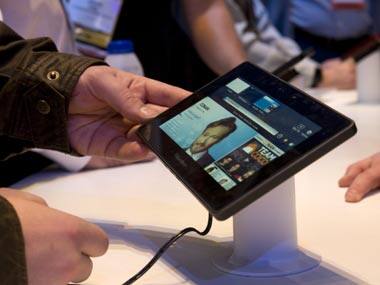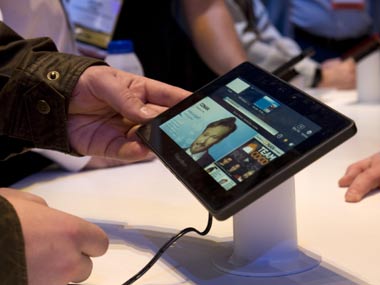In a statement released on Friday , the Canadian tech company said that it has written down its inventory of unsold Blackberry PlayBooks, slashing its pre-tax profit predictions by $485 mn. It also said that it would miss its previously revised 2012 profit targets. RIM took a hit of $50 mn on revenues because of the network outage that disconnected millions of users worldwide for days earlier in the year. The statement also revised expectations on earnings:
“RIM expects adjusted diluted earnings per share in the third quarter to be at the low- to mid-point of the US $1.20-US $1.40 per share range it previously guided.”
Shares fell over 9 percent to $16.85 in response, having already collapsed by 70 percent this year. The company is hoping that poor PlayBook sales can be improved through “aggressive” promotional activity. Said RIM’s co-CEO Mike Lazaridis:
“Although a number of factors have led to the need for an inventory provision in the third quarter, we believe the PlayBook, which will be further enhanced with the upcoming PlayBook OS 2.0 software, is a compelling tablet for consumers that also offers unique security and manageability features for the enterprise.”
[caption id=“attachment_148600” align=“alignleft” width=“380” caption=“RIM reduced the price of the PlayBook to $199 when the Kindle Fire came out in September. Reuters”]
 [/caption] RIM reduced the price of the PlayBook to $199 when the Kindle Fire came out in September and
will be expanding those promotions globally
. They might well be inspired by HP’s deep discounts on the TouchPad which, although also being panned by critics, was
second only to the iPad in sales last quarter
. Sales of the PlayBook have been consistently in decline, dropping from 200,000 in the second quarter to 150,000 in the third, compared to Apple’s 11 mn iPads sold in the third quarter. Yet Lazaridis has said their promo strategy has been successful:
[/caption] RIM reduced the price of the PlayBook to $199 when the Kindle Fire came out in September and
will be expanding those promotions globally
. They might well be inspired by HP’s deep discounts on the TouchPad which, although also being panned by critics, was
second only to the iPad in sales last quarter
. Sales of the PlayBook have been consistently in decline, dropping from 200,000 in the second quarter to 150,000 in the third, compared to Apple’s 11 mn iPads sold in the third quarter. Yet Lazaridis has said their promo strategy has been successful:
“Early results from recent PlayBook promotions indicate a significant increase in demand across most channels. “We look forward to continuing to grow the installed base of PlayBook users and to attracting more and more developers to expand the volume of applications, content and services that leverage the power of the industry leading QNX-based platform.”
But a firesale of PlayBooks would mean the company selling a product that was supposed to showcase their new BBX operating system at a loss . Matt Thornton, an analyst at Avian Securities LLC, told Business Week :
“If they’re selling it at $199, they’re already in the red. For every one they sell, they’re losing money.”
The company can’t abandon the under-performing tablet, however.
“You can’t kill it. The PlayBook is all they have to show developers, they don’t have a smartphone yet.”
Impact Shorts
More ShortsThe first BBX smartphones are not expected until later in 2012 after the company said that they won’t be released ‘until they’re ready’. They also refused to reconfirm the previously mentioned release window the first quarter of next year for the new handsets. Analysts are pessimistic about RIM’s recovery. National Bank Financial analyst Kris Thompson told ZDNetAsia :
“Our thesis remains that BlackBerry channel inventory remains at risk of becoming stale next year, much like the failed PlayBook. We expect RIM’s performance to deteriorate in future quarters and have little hope for a recovery from the new BBX platform.”
Analysts Morgan Keegan went even further :
“RIM appears to be trading at liquidation value. We estimate that RIM need only sell ~4 mm handsets/quarter to break even, although long term, a sub base of 45mm+ and shipments of 7mm+/qtr is needed for viability at the current cost structure (in our opinion).”
RIM is not just in a dip, it is fighting for survival. Competition in the tablet and smartphone markets hots up on a monthly basis. But RIM hasn’t even managed to fix its crippled PlayBook, which shipped without native email in April. The upgrade that was supposed to solve that problem is now not expected until February 2012. RIM has a long journey back from the brink, and its relentlessly upbeat messaging is worrying, indicating that its executives are in denial. RIM has to acknowledge its problems, provide a timeframe for solutions and then actually keep to its schedule. The constant failure to fix the PlayBook and produce a BBX smartphone undermines not just investors’ confidence in the company, but also app developers and, crucially, customers.
)